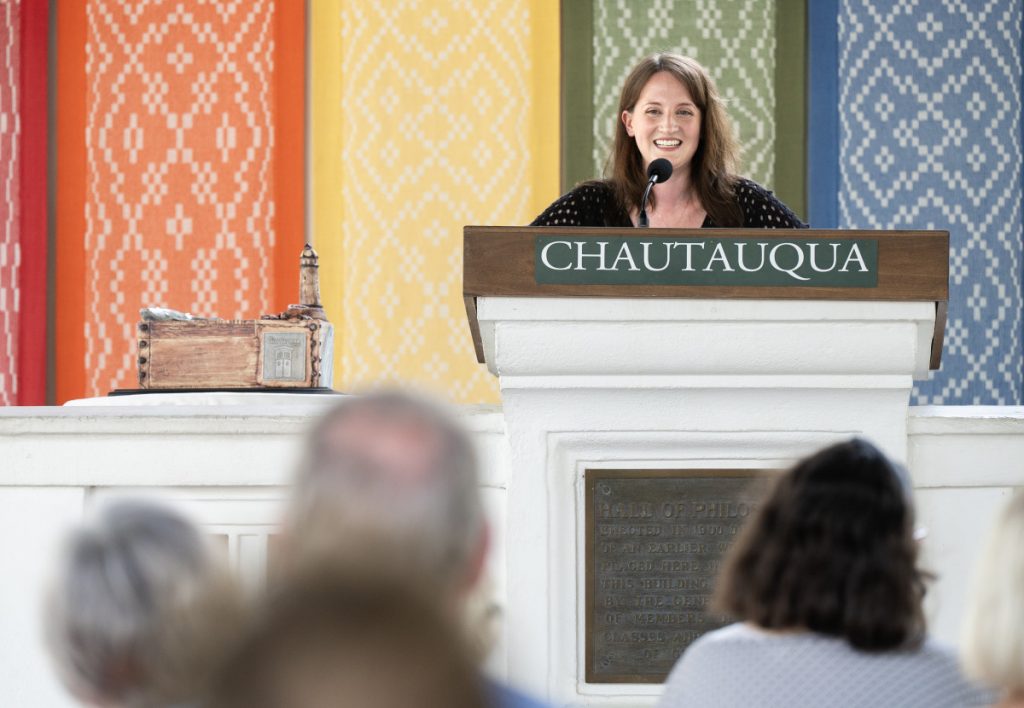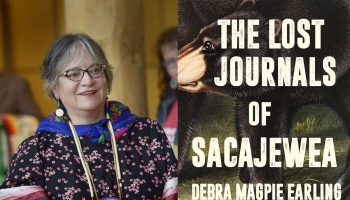

Susie Anderson
Staff writer
When Elizabeth O’Connor returned to her grandmother’s family’s fishing cabin off the coast of the United Kingdom, she discovered it on the brink of transformation. An English couple, eager to transform the cottage into a vacation home, outlined their renovation plans.
“They wanted to pave over the vegetable garden at the front of the house, which my family had used to grow vegetables for generations, and construct an outdoor pizza oven,” O’Connor said. “They made a joke about the old outside toilet — how it might be marketed as green and attract eco-tourists.”
The moment struck her as an emblematic shift — one described by coastal historian John Gillis, who wrote, “There were those who live on the shore and those who live with it.”
The delicate balance — between land and sea, preservation and transformation and remembering and forgetting, served as the basis for O’Connor’s debut novel Whale Fall.
Last Friday in the Hall of Philosophy, the 2025 Chautauqua Prize was awarded to Whale Fall, and O’Connor celebrated as the 14th author to pen a Prize winner. Emily and Richard Smucker Chair for Education Jordan Steves introduced the work, published in May 2024 and listed as a Best Book of the Year by The New York Times and NPR, an ALA Notable Fiction Book and longlisted for the Dublin Literary Award. From a record-breaking 394 submissions read by a community of 120 volunteer Chautauquan readers, Whale Fall won out, Steves said.
“Readers declared this novel is a work that demands absorption and investment, a story that is both haunted and haunting, a force on its own and masterfully done,” Steves said.
From a longlist to shortlist to selection of finalists, this year’s prize was judged by Steves, Michael I. Rudell Artistic Director of Literary Arts and Writer in Residence Kwame Alexander, and Managing Director of Literary Arts Stephine Hunt, along with Prize coordinator Emily Carpenter and Daily editor Sara Toth. The jury was rounded out by Andrew Krivák, whose book The Sojourn won the first-ever Chautauqua Prize, and literary scholar Gena E. Chandler.
The Prize included a $7,500 stipend and weeklong retreat in Chautauqua for O’Connor, as well as a physical prize designed by a group of selected Chautauqua and local artists to celebrate the award-winning fiction, literary nonfiction or poetry collection. Capturing the scene of the coastline and whale carcass, this year’s prize was sculpted by Chautauqua Visual Arts’ Adilene Rosales, Rick Sullivan, Brian McGrath and Raoul Pacheco. The physical prize captures the essence of a novel that presents a shifting coastal life with a throughline of a decaying whale carcass.
“It is a rich, metaphorical examination of the bones of what makes us human — history, culture, storytelling — against the backdrop of literal bones of a decaying whale carcass washed ashore on the coast of Wales,” Steves said.
O’Connor highlighted the coastal ecotone — a transition point between the ecosystem of the sea and land — as a place of exploration for her novel.
“The organisms living on an ecotone are defined by their ability to live on this edge — belonging to both ecological communities and neither,” she said. “I think of my grandmother’s family being, in some ways, an ecotonal people.”
Unlike the coast that her grandmother knew, O’Connor noted that shorelines now are facing climate change and transformation. The state of flux of the coastline provided the groundwork for the imaginative exploration of coastal life in Whale Fall.
Set on an isolated island off the coast of Wales just before the outbreak of World War II, Whale Fall follows a young woman navigating life in a community with around 40 inhabitants that live tethered to the sea and its ecology. As the island in Whale Fall and the book’s main character, Manod, stand at a precipice with an encroaching mainland and the brink of the Second World War, the novel navigates anxieties of the in-between.
“I wondered what these communities could tell us about living at a time of similar climate anxiety — about how culture and ways of living might be influenced by the landscapes we live alongside, especially when those landscapes symbolize a kind of alienation and loss,” O’Connor said.
O’Connor read from the beginning of the novel, introducing audiences to the eponymous whale.
She described how early in the writing process, she watched a conference talk on whale beachings on Canadian islands and the transformation of coastal cultures as a result.
“It made me think about the intersection of nature and narrative and how people respond to the land around them,” she said.
The ecological transformation of a whale fall signifies the blossoming of organisms that build life from the nutrients of the carcass while also presenting the death of the animal.
“The whale of the novel, for me, became a manifestation of the island on a precipice of change — something ending, but something new — as well as the protagonist’s feeling of unbelonging, stranded in her own way,” O’Connor said.
O’Connor also read a section highlighting the protagonist Manod’s relationship with her younger sister — and Manod’s embroidery, inspired by an artist O’Connor met.
“I visited an exhibition by an embroider named Britta Marakatt-Labba who is a Sámi artist whose stitch seams of folklore and nature, I remember rushing home to write these final scenes to put embroidery in the novel,” O’Connor said. “It became a quiet act of storytelling in the novel, a way for Manod to make sense of her world, threading memory, grief and identity together.”
O’Connor explored archives and read memoirs of those who evacuated the islands of St. Kilda, Bardsey and the Blaskets. She explored the portrayal of these islands in popular culture, including the 1930s’ film “Man of Aran” that centered on an island family that ultimately was no family at all.
“The director had picked the most photogenic islanders and put them at the center of his film and asked them to do different rituals in the water, one of them was hunting sharks — which they never did because the water was too dangerous,” O’Connor said.
The gulf of understanding between mainlanders and islanders served a central purpose in her novel with the introduction of the two English ethnographers into Manod’s life and home.
O’Connor credited Irish author Claire Keegan as an inspiration and the person to thank for the fact that her novel was shorter than publishers had initially wanted. She also highlighted the work of scientific author Rachel Carson and American modernist Hilda Doolittle.
“I would mention, should you be in your neighboring state of Pennsylvania, this is where (Doolittle) is buried and there is a wonderful tradition of bringing seashells to her gravestone and leaving them around it,” O’Connor said.
O’Connor closed with a reading from a scene depicting the Welsh tradition of Mari Lwyd and reflected on the timeliness of a story discussing encroaching powers on an existing, if not disappearing, civilization.
“At its heart, the novel explores the working class relationship with nature — how labor versus leisure defines many people’s experience of the land,” O’Connor said. “It also grapples with the idea of landscapes becoming uninhabitable, a theme that unfortunately, resonates deeply today.”




